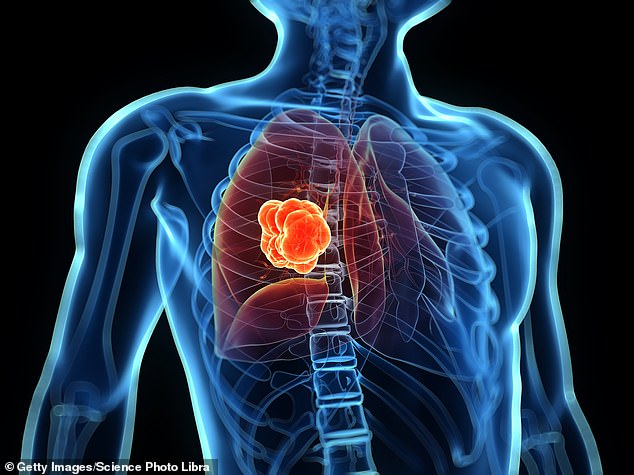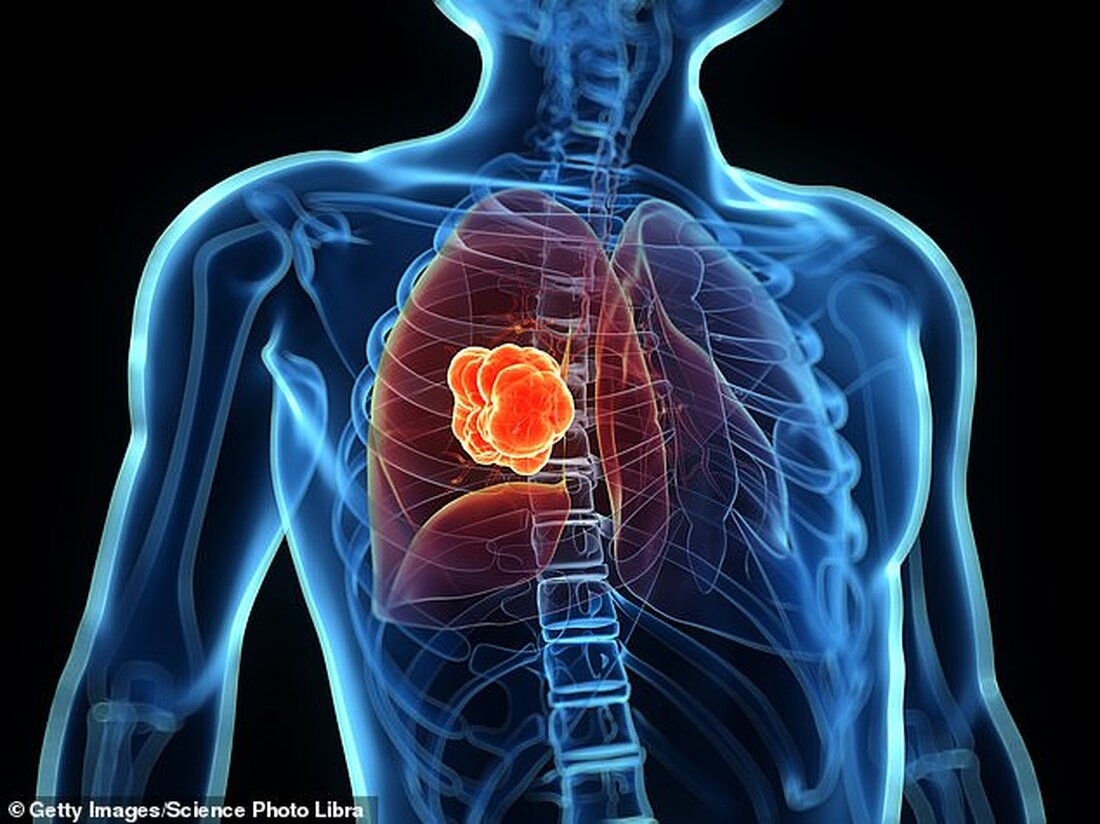Thousands more NHS patients with a deadly type of lung cancer are set to benefit from a drug hailed as the biggest treatment breakthrough in decades.
Sotorasib is a daily tablet that has been shown to shrink tumors in half of patients with advanced lung cancer not caused by smoking.
This type, which affects one in eight lung cancer patients, is caused by a mutation in a gene known as KRAS.
It is a particularly deadly form of cancer, with current treatments only effective in about ten percent of those affected.
In a healthy body, the KRAS gene controls proteins involved in normal cell growth. But mutated KRAS genes allow the proteins to instruct cells to grow uncontrollably, causing a cancer that is notoriously difficult to treat.

Thousands more NHS patients with a deadly type of lung cancer are set to benefit from a drug hailed as the biggest treatment breakthrough in decades (archive image)
The cancer-causing power of the mutated gene is so great that doctors are calling it the “death star” of cancer.
The same mutation is also found in some cases of pancreatic and colon cancer, raising hopes that sotorasib may help many more patients in the future.
Previously, sotorasib was only available to NHS patients as part of a limited trial.
But now everyone who needs it - expected to be at least 600 more people a year - will benefit after the NHS negotiated a discount with US drugmaker Amgen.
“This drug is one of the most exciting breakthroughs in lung cancer in 20 years,” says Professor Charles Swanton, an expert in genetics and lung cancer at the Crick Institute in London.
"And it will improve survival for patients with limited options. Nearly half of patients will see their tumor shrink, compared to less than 10 percent for some drug treatments."
Lung cancer is the third most common form of the disease in the UK, with an estimated 48,000 new cases every year.
Smoking or a recent history of smoking is by far the most common cause, but the disease can still affect those who may have never touched a cigarette before.
In the 1980s, scientists first discovered that a significant proportion of these cases were caused by a mutated form of the KRAS gene, but solving the puzzle of how to combat this defect has required decades of intensive research.
Sotorasib, also known by the brand name Lumykras, blocks the action of proteins that cause cancer cells to grow.
This helps stop or at least slow its spread.
Currently, the drug is only offered to patients who have exhausted all other treatment options and whose cancer has spread elsewhere in their body.
However, there is hope that sotorasib can be used at an earlier stage in the future, potentially increasing long-term survival rates.
Dr. Noor Tariq, a specialist at Clatterbridge Cancer Center in Liverpool, said: "The results so far have been amazing. The next question is, will it work even better if used earlier in the treatment process? This is now being investigated in trials and we're excited to see what they show."
Nicky Peel, 53, from Brecon in Powys, was one of the first lung cancer patients in the UK to be given sotorasib.
She was diagnosed with the disease in 2017 after spending months "waking up and feeling like I couldn't breathe."
“It was such a terrible shock – you never believe it would happen to you,” she says. “I was told my life expectancy at that point was about 12 to 18 months.”
Nicky, an IT manager, underwent grueling chemotherapy and radiotherapy, followed by treatment with a drug to boost her immune system and fight the cancer cells.
But in January 2018, scans showed the cancer had spread to her spine and hips, while the lung tumors had continued to grow.
She then asked her oncologist at the NHS Velindre Cancer Center in Cardiff if she could be given sotorasib.
“I had read online that the drug had shown good results in American patients with my type of cancer,” says Nicky.
Her consultant applied for funding on compassionate grounds and Nicky started taking the drug in December last year - initially just half the recommended eight tablets a day for liver damage, one of the recognized side effects.
A few weeks later, when her liver tests came back clear, she was switched to the full dose.
“I was hoping it would just stabilize my cancer, but when I had my first scan in January it showed the tumors in my lungs had shrunk by about a third,” says Nicky.
"I couldn't believe it - it was too good to be true. None of my previous treatments had managed to shrink the tumors. And apart from mild bone and muscle pain, I was free of side effects."
Nicky admits she has no idea whether the drug will continue to keep her cancer at bay. But she adds: “It gives me more quality time to spend with family and allows me to live my life to the fullest – not just to survive.
“I want to have a good quality of life, and sotorasib helps me do that.”

 Suche
Suche
 Mein Konto
Mein Konto

